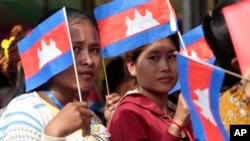Human rights defenders, pro-democracy groups, and even U.S. lawmakers have rebuked Prime Minister Hun Sen’s government for its apparent attacks on media outlets and the closure of a democracy promotion group in Cambodia.
Last week, Hun Sen branded the American-owned English-language newspaper the Cambodia Daily a “thief” for allegedly avoiding millions of dollars in tax since its founding almost 25 years ago, giving its management until September 4 to pay up or close down.
Two days later, the government decided to close the National Democratic Institute (NDI), a U.S.-funded democracy promotion outfit, for allegedly violating the NGO law.
The moves against U.S.-funded institutions continued with the closure of more than a dozen local radio stations that sell air time to Voice of America and Radio Free Asia. Minister of Information Khieu Kanharith threatened legal action against station owners whom he claimed had been in “breach of trust” with the government.
Both international and local human rights groups responded quickly to the attacks, with Human Rights Watch (HRW) claiming the moves were aimed at silencing critics ahead of a crucial general election next year.
“The Cambodian government’s shutdown of independent media outlets and a respected democracy promotion group shows that Hun Sen is intensifying efforts to curb criticism of his rule,” HRW Asia division’s deputy director Phil Robertson said in a statement. “Diplomats and donors should put Hun Sen on notice that if he doesn’t reverse course, elections in 2018 won’t be considered credible.”
The group also noted that Hun Sen recently ordered the closure of the election monitoring coalition the Situation Room, accusing its members, such as local rights groups Licadho and Adhoc, of conspiring to create a “color revolution” in the country.
But government spokesman Phay Siphan, who sought refuge in the United States after Vietnam invaded to overthrow the Khmer Rouge in 1979, said the government would “not take any orders from foreigners”, adding that Human Rights Watch was “just an enemy that is always jealous of Cambodia.”
Voice of Democracy, a radio station run by the Cambodian Center for Independent Media (CCIM), also announced its service had been “totally blocked” by the government.
“CCIM believes that the action of the government to shut down independent media in Cambodia is politically motivated in preparation for the general elections scheduled for July next year,” CCIM said in a statement.
U.S. officials, including veteran Senator John McCain, have also called on the Trump administration to take action against Hun Sen’s government over the crackdown.
But Phay Siphan, the government spokesman, said such statements were a “confession” that backed up government assertions that U.S. interests were attempting to “interfere” in Cambodia.
In May 1965, Cambodia broke off diplomatic relations with the United States following U.S.-backed bombings of Cambodian villages and an alleged plot to overthrow his neutral regime.
Chan Vibol, a political scientist, said the current tension was unlikely to lead to another severing of ties between the two states, but that intervention from third-parties would be necessary to avoid such an eventuality.
“The institutes and both governments should work together to establish a different working culture together in order to study the current situation and find a way to settle their issues,” he said.




